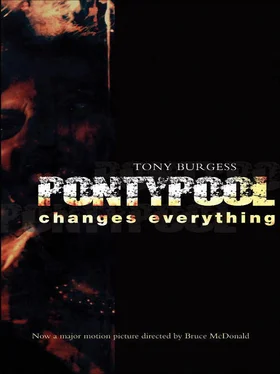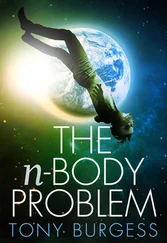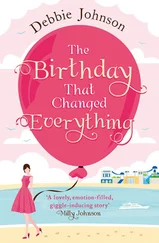In this little patch of land, a sort of old smudge at the edge of a new drawing, a doomed population of wildlife was living out its final generation in manic friendlessness. Snakes copulated on the drying scalp of the terrain. A fox scrambled back and forth along an unearthed concrete conduit. A million mites lived on the rust from a single barb of wire. At night their eyes shone and their microscopic faces vibrated with insanity. Migrating birds that had made this a rest spot for hundreds of years now sensed something was terribly wrong. They lit on the backs of barrels in the fat brown river, and when their young looked hungrily at a suicided worm or a grinning minnow, they clicked their beaks, sadly, “No.” At night a faint popping sound could be heard up and down the river, as weak heart valves in the young owl population strained to sustain life until morning.
Jimmy spent a great deal of time here as a naturalist, learning to observe, to read into what animals wrote. And he read very well. When he climbed the hill in the late afternoon he always looked back over his shoulder, because he knew that this little patch of land was teeming with sick, unpredictable minds.
The vivid certainty that button-eyed rats were throwing themselves at his heels as he made his final scramble over the top of the hill made him scream. He ran through the yard to a back door that seemed to be held at an impossible distance. A family photo of the door dangled at the edge of the lawn, without enough dimension to escape through. The snapshot’s border of chemicals, the loss of his mother’s face into the glare of the sun or the flash of a distant bulb, sucked the oxygen from his lungs. He was lucky to complete the dash through his own backyard. Jimmy heard people reading aloud from magazines as he kicked at the ground between himself and this door, reading aloud about the boy who died legless and insane in his own backyard. His screams, these daily screams, were never heard because of another peculiarity about this property.
This house lay directly under the last leg of an airplane highway. Every five minutes, in the late afternoon, a commercial airplane tore up the air, drowning out Jimmy’s screams, dropping its landing gear just this side of the chimney so as to miss it and fall from the sky into Jimmy’s tortured ravine. While these planes landed somewhere else safely, they had also crashed moments before — eating up the ground with their noise; eating up Jimmy’s wailing, and ending the world over and over and over again.
As he lay there, for he always fell down to clutch the ground before he died, Jimmy saw the tiny red-button eyes of ravine rats look up and shatter. These tiny plastic shards flew across him as the belly of the plane lay on the earth to finally, after so many threats, end this. Needless to say, Jimmy was never able to finish his dinner, and when asked what he had been doing, Jimmy felt his young pathology squeezing his brain.
The more conventional fear, that his parents were aliens, was becoming a comfort.
Today is Jimmy’s seventh birthday, and his mother, or rather the alien who looks like her, is baking a cake shaped like a rocketship with a blue Commander Tom profile at the base. Like his mother, the artistic Jimmy is busy creating, and the tiny explosions he makes with his mouth attract her attention. He senses her alien eyes on him, and he looks up in time to catch her wiping the tell-tale green of the icing from her extraterrestrial nose.
“Jimmy, are you drawing those nasty drawings again?”
She slams her powdered hand down on the drawing before Jimmy has a chance to pull it away, and she turns it toward her. The drawing depicts a giant rat covered with buttons that are being sewn onto it by an airplane captain who is stretching from his cockpit to stab a needle into the rat’s eye. Assorted cowboys and Indians and dinosaurs are scattered in pieces around the plane.
“Jimmy, why don’t you ever draw nice things? And whatever you do, don’t let Missus see these. Hide them with the others in your room. Now go out and play in the pool with your sister.”
Missus was the woman who came in and cleaned once a week. She was a Jehovah’s Witness who became confused and angry at even the thought of dinosaurs. Upon seeing one of Jimmy’s drawings she asked to leave immediately; clutching her old heart, she limped home in a state of abjection. Jimmy’s mother watched helplessly from behind the curtains in the kitchen. Missus returned the following week, but she has never entered, nor has she since been asked to enter, the boy’s room.
“Careful out there, your father’s tools are lying all over the place. Take a towel.”
Now there’s the hill, that lost wall, and the weasels are wiping their gums against it. At a distance, somewhere above Jane and Finch, two airplanes are waiting at an intersection. And in the lawn below and to the west is a small rectangle punched into the ground coated with concrete and filled with water.
In this wading pool stands an eight-year-old girl. Beside the pool stands a seven-year-old boy. The boy strolls over to a saw that hangs at an angle in a plank that is stretched between two sawhorses. He rocks the saw until it squawks out of the wood.
There are thoughts going through this child’s head, which is normal. As normal as it is to place thoughts in a head. And they are arriving and departing in the usual custom. That is, as far as it is usual for thoughts to arrive and depart. These thoughts, idle and wandering, are picking up speed, accumulating a motive from the way they are arranged. There is a dangerous belief in the corners they turn.
These thoughts: The saw can enter wood and my father can leave it there. Can it enter my sister and can I leave it there? To the saw, my ruler, my king, my sister is wet inside like wood, and her grain is looser and nearly separated anyway. So where is the difference if I draw the separation out? Make her wood. The same. She is wood. Peaceful and heavy. The little teeth marching across her shoulder. That’s it.
The grim little mouth the saw has made in the plank blows blonde fibres from its lips and gives the word. Jimmy slips into the pool clumsily, dragging the saw behind him.
Behind Julie’s head is the deep blue of the sky. A blue most like that colour is at her shoulders, whitening as it leaves her, travelling upward. On the surface of the sky, microscopic bacteria living in Jimmy’s eyes flow from the sun into Julie, who is smiling. They’re glancing down at her shoulder, inviting the saw there. Jimmy lays it on her shoulder and draws it towards himself. Then he pushes it along a groove that starts easily in the skin. A bright strip of blood highlights the course — down through her body — the saw will take. Julie’s face is calm, at least as calm as Jimmy’s, and she smiles with a full understanding of what is happening.
When their father runs around the pool, as if up a ramp, his mouth is open and through it an airplane comes out of the sky. Julie and Jimmy lean towards each other and kiss in the silence of this moment. Now husband and wife, they kiss each other goodbye forever. When the airplane advances past the sky and their father’s voice starts up in his mouth again, Julie and Jimmy pull apart sheepishly and Julie begins to howl in pain, holding her shoulder. Jimmy sees, for the first time, all the blood in the water.
In every home movie and photograph that their father will take this summer, the girl’s shoulder will have a large pad of gauze taped to it. And Julie and Jimmy will grow apart like brother and sister.
This event also marks Jimmy’s first deliberate silence, a silence that will last three months and will return every three months. Like now, as they make their way up the path in the dark, four cottages away from where people are eating each other alive in a now brightly lit bedroom.
Читать дальше












